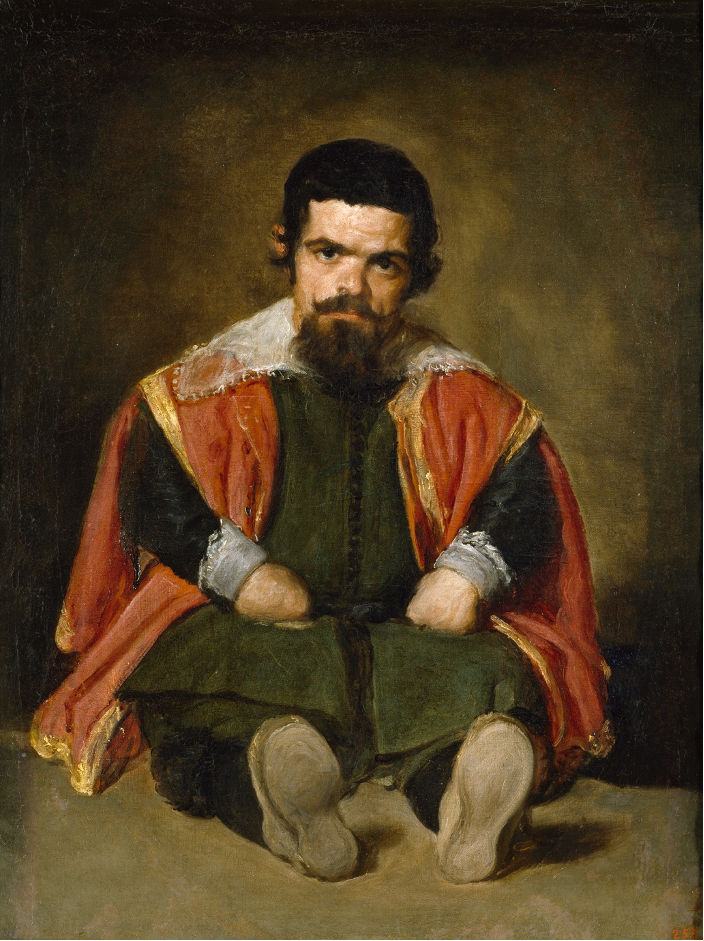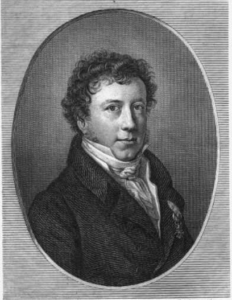The dwarf
(Poet's title: Der Zwerg)
Set by Schubert:
D 771
[1822]
Im trüben Licht verschwinden schon die Berge,
Es schwebt das Schiff auf glatten Meereswogen,
Worauf die Königin mit ihrem Zwerge.
Sie schaut empor zum hochgewölbten Bogen,
Hinauf zur lichtdurchwirkten blauen Ferne,
Die mit der Milch des Himmels blass durchzogen.
Nie habt ihr mir gelogen noch, ihr Sterne,
So ruft sie aus, bald werd ich nun entschwinden,
Ihr sagt es mir, doch sterb ich wahrlich gerne.
Da tritt der Zwerg zur Königin, mag binden
Um ihren Hals die Schnur von roter Seide,
Und weint, als wollt’ er schnell vor Gram erblinden.
Er spricht: Du selbst bist schuld an diesem Leide,
Weil um den König du mich hast verlassen,
Jetzt weckt dein Sterben einzig mir noch Freude.
Zwar werd ich ewiglich mich selber hassen,
Der dir mit dieser Hand den Tod gegeben,
Doch musst zum frühen Grab du nun erblassen.
Sie legt die Hand auf’s Herz voll jungem Leben,
Und aus dem Aug die schweren Tränen rinnen,
Das sie zum Himmel betend will erheben.
Mögst du nicht Schmerz durch meinen Tod gewinnen!
Sie sagt’s, da küsst der Zwerg die bleichen Wangen,
D’rauf alsobald . . . vergehen ihr die Sinnen.
Der Zwerg schaut an die Frau, vom Tod befangen,
Er senkt sie tief ins Meer mit eignen Handen,
Ihm brennt nach ihr das Herz so voll Verlangen
An keiner Küste wird er je mehr landen.
The mountains are already fading in the dull light,
The ship is drifting over the flat waves of the sea
And on it is the Queen with her dwarf.
She looks up towards the high vaulted arching sky,
Up at the blue yonder interwoven with light
That is speckled with the pale milk of heaven.
Stars, you have never yet lied to me,
She calls out, I am soon going to disappear,
You tell me, but I am truly happy to die.
Then the dwarf steps towards the Queen, determined to wrap
Around her neck the cord of red silk,
And he weeps, as if he wants to blind himself quickly out of grief.
He speaks: It is you who are responsible for this pain,
Because you left me for the King:
Now at least your death will restore my joy.
It is true that I am going to hate myself for ever
For killing you with these hands,
Yet you will have to perish in an early grave.
She lays her hand on her heart full of young life
And heavy tears fall from her eyes
As she tries to raise them to heaven in prayer.
May you not suffer agonies as a result of my death!
She says, then the dwarf kisses her pale cheeks
From which all sensation immediately vanishes.
The dwarf beholds the woman, gripped by death,
He pushes her deep into the sea with his own hands,
His heart is burning for her with such total longing, –
He will never again land on any shore.
All translations into English that appear on this website, unless otherwise stated, are by Malcolm Wren. You are free to use them on condition that you acknowledge Malcolm Wren as the translator and schubertsong.uk as the source. Unless otherwise stated, the comments and essays that appear after the texts and translations are by Malcolm Wren and are © Copyright.
☙
Themes and images in this text:
Blue Boats By water – beaches and general Cheeks Dwarfs and gnomes Evening and the setting sun Eyes Fading and losing colour Graves and burials Hands Hearts Heaven, the sky Hills and mountains Joy Kings and Emperors Kissing Longing and yearning Murder On the water – rowing and sailing Pain Prayers and praying Red and purple The sea Ships Silk Stars Tears and crying Throats Under the water, sinking and drowning Waves – Woge
When this gory story was first published in 1813 it had the title ‘Treubruch‘: Infidelity. It was not called ‘Der Zwerg‘ until a slightly revised version was published in 1827. There are elements of a ‘whodunnit?’ in this narrative (clue: it might not have been the dwarf acting alone), but perhaps the question of motive (‘whydunnit?’) is the most important thread (apart from the red thread that is the murder weapon, of course). It is all a matter of piecing together the back story to understand the relationship between the Queen, ‘her’ dwarf and the King. Part of the power of the narrative is that we will all come to different conclusions and have different theories.
So, what sort of queen and what sort of dwarf are we dealing with? If she is from the world of Norse Sagas the dwarf might be a creature of the earth, a miner or a smith perhaps. If she is from southern Europe (perhaps in the 16th or 17th century) her companion would be a ‘court dwarf’ (similar to those painted with such sympathy and insight by Velazquez). Does the narrative invite us to share or to question the assumption in many traditional stories that people with dwarfism are inherently untrustworthy? Are we supposed to feel revulsion or sympathy when we realise the power of the dwarf’s passion for the Queen?

Madrid, Prado
Who was the King? It may be the case that the Queen had not yet met him. She may have been betrothed to him in absentia and she might be on the journey that will take her to her new home and husband. If this is the scenario, we are almost certainly dealing with a ‘court dwarf’, the sort of companion (or almost pet) that was frequently part of the diplomatic conventions in royal weddings and treaties. However, this might not explain why the queen and the dwarf are alone on the boat (unless they have already thrown the other passengers overboard). Another possibility is that the King is already lying in a pool of his own blood somewhere in the palace and that the Queen and the dwarf are now on the get-away ship having successfully fled the scene. There is nothing in the poem to refute the idea that the pair have been plotting the whole thing together.
The question then would be: to what extent is she complicit in her own murder? She looks to the stars (perhaps she used to have her own court astrologer along with her court dwarf) and she sees her doom written in the Milky Way. Or perhaps she is just using the idea of fate to confirm a decision she has already taken. We might be in one of those mystery stories where suicide has been made to look like murder. Perhaps the dwarf has been persuaded to play out a mock murder, or to facilitate her suicide. This would explain why in her final words she tells the dwarf not to feel agony over her death, as if he is not to blame.
Or is it simply that she knows she is guilty? Just as the dwarf said, it is her fault because she was unfaithful. Perhaps she has just accepted the inevitable consequence of her actions (rather like Carmen willing her former lover to kill her after she had read her fate in the cards).
The final image of the dwarf alone on an endless ocean reminds us that the core mystery remains. He had claimed that he would never know joy again unless the Queen died, yet as soon as he has pushed her body into the sea he is burning with a total, inextinquishable longing. His torments have barely started. Such is the mystery of human passion. Yes, ‘passion’ is the word. Sex and violence. There is no end to it, and there is no fathoming it.
☙
Original Spelling and note on the text Der Zwerg Im trüben Licht verschwinden schon die Berge, Es schwebt das Schiff auf glatten Meereswogen, Worauf die Königinn mit ihrem Zwerge. Sie schaut empor zum hochgewölbten Bogen, Hinauf zur lichtdurchwirkten blauen Ferne, Die mit der Milch des Himmels blaß durchzogen. Nie habt ihr mir gelogen noch, ihr Sterne, So ruft sie aus, bald werd' ich nun entschwinden, Ihr sagt es mir, doch sterb' ich wahrlich gerne. Da tritt1 der Zwerg zur Königinn, mag binden Um ihren Hals die Schnur von rother Seide, Und weint, als wollt' er schnell vor Gram erblinden. Er spricht: Du selbst bist schuld an diesem Leide, Weil um den König du mich hast verlassen: Jetzt weckt dein Sterben einzig mir noch Freude. Zwar werd' ich ewiglich mich selber hassen, Der dir mit dieser Hand den Tod gegeben, Doch mußt zum frühen Grab du nun erblassen. Sie legt die Hand auf's Herz voll jungem Leben, Und aus dem Aug die schweren Thränen rinnen, Das sie zum Himmel bethend will erheben. Mögst du nicht Schmerz durch meinen Tod gewinnen! Sie sagt's, da küßt der Zwerg die bleichen Wangen, D'rauf alsobald vergehen ihr die Sinnen. Der Zwerg schaut an die Frau, vom Tod befangen, Er senkt sie tief in's Meer mit eig'nen Handen, Ihm brennt nach ihr das Herz so voll Verlangen, - An keiner Küste wird er je mehr landen. 1 Schubert changed the original 'geht' (goes) to 'tritt' (steps)
Confirmed by Peter Rastl with Schubert’s probable source, Selam. Ein Almanach für Freunde des Mannigfaltigen auf das Jahr 1813. Herausgegeben von I.F.Castelli. Wien, gedruckt und im Verlage bey Anton Strauß, pages 68-69.
To see an early edition of the text, go to page 68 [114 von 342] here: http://digital.onb.ac.at/OnbViewer/viewer.faces?doc=ABO_%2BZ255496507


